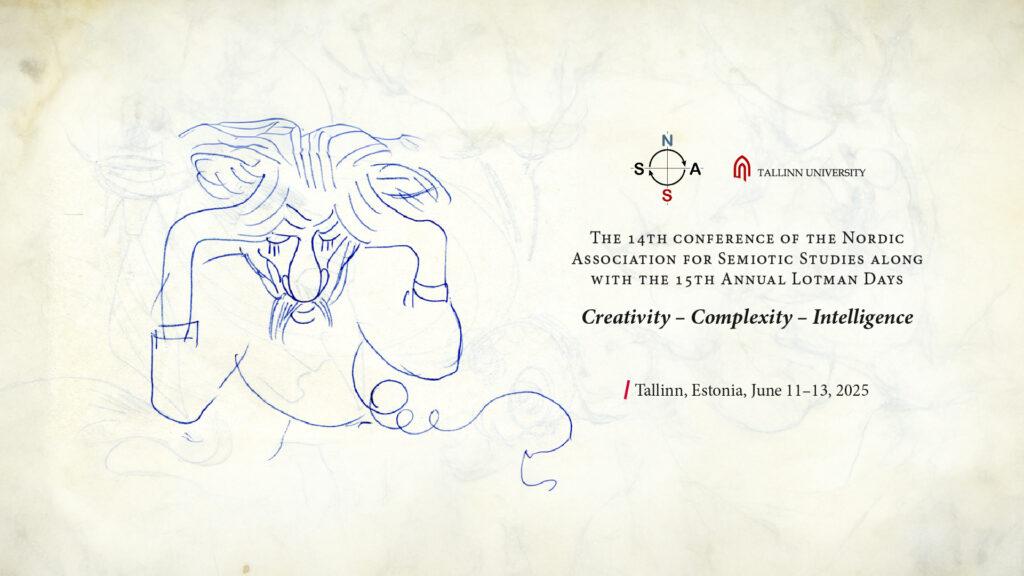“Creativity – Complexity – Intelligence“
The 14th conference of the Nordic Association for Semiotic Studies along with the 15th Annual Lotman Days
Tallinn, Estonia, June 11–13, 2025
The intricate interplay of signs with the processes of creativity, complexity, and intelligence is immersed in all varieties, modalities, and ecologies of meaning-making. Meaning-making is always creative, complex, and intelligent, in both its agreements, alignments, and continuums, as well as its incompatibilities, controversies, and contradictions.
According to Juri Lotman, one of the defining characteristics of an intelligent semiotic system is its ability to be creative, i.e. the ability to produce new and unpredictable meanings. Lotman noted that this ability is not exclusive to the human mind but can occur in various other systems and at multiple scales, where a sufficient degree of complexity is present.
The role of creativity in learning and development, be it in humans or non-humans, is integrative within patterns of emergence, reproduction, and decay in complex systems, such as nature, culture, or the individual mind. Intelligence – be it organic or artificial, individual or collective – manifests in various signs and sign systems and is in time creatively transformed through meaning-making.
We kindly invite proposals for conference presentations and sessions of presentations on the dynamic relationships between signs, creativity, complexity, and intelligence and their transformative impact within education, art or the arts, play, and scientific inquiry.
Registration for the conference is now open! For more information visit conference homepage: https://nordicsemiotics.org/nass-tallinn-2025/
Registration: 125 € (March 1 to April 15, 2025), 150 € (April 16 to May 16, 2025). Registration fee includes lunches on all days, coffee breaks, abstract book, and NASS membership fee.
Important dates:
- January 31, 2025 – Extended deadline for submitting proposals
- February 28, 2025 – Notification of acceptance of presentation
- March 1 to April 15, 2025 – Early bird registration
- April 16 to May 16, 2025 – Late bird registration
- June 11 to June 13, 2025 – The conference
Call for papers can be downloaded here in English, and here in Russian.
Confirmed plenary speakers
- Terrence Deacon, University of California, Berkeley, USA
- Joanna Rączaszek-Leonardi, University of Warsaw, Poland
- Aaro Toomela, Tallinn University, Estonia
We welcome papers on the topics of interest, including but not limited to:
- Semiotic theories of creativity, complexity, and intelligence;
- The nature and culture of creativity, complexity, and intelligence;
- Semiotics, psychology, and cognitive science of creativity, complexity, and intelligence;
- Creativity, complexity, and intelligence in various modalities of meaning-making;
- Creativity, complexity, and intelligence in humans and non-humans;
- The relationships between various cognitive processes and creativity, complexity, and intelligence;
- Agency, the self, and subjectivity within creativity, complexity, and intelligence;
- Creativity, complexity, and intelligence in organic and artificial systems;
- Emergence and decay of creativity, complexity, and intelligence;
- Creativity, complexity, and intelligence in art, play, and science;
- Creativity, complexity, and intelligence in education, learning and development;
- Language and other sign systems in relation to creativity, complexity, and intelligence;
- Digital technologies in relation to creativity, complexity, and intelligence;
- Ecologies of creativity, complexity, and intelligence;
- Futures and prospects of creativity, complexity, and intelligence – expectations and anticipations.
The conference is organized by the Nordic Association for Semiotic Studies, Tallinn University School of Humanities, and the Juri Lotman Semiotics Repository. The official languages of the conference are English and Russian. All participants are expected to attend in person, as online participation is not available.
